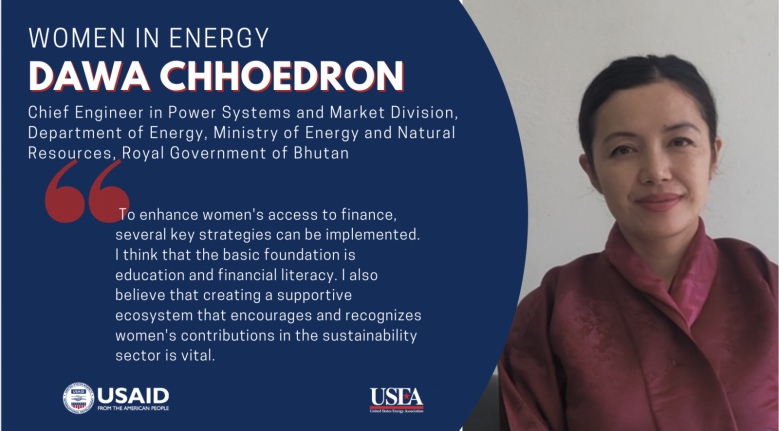
Women in Energy: Dawa Chhoedron
The Women in Energy series is a joint project between USEA and USAID to help improve the visibility of women's participation and leadership in the traditionally male-dominated energy sector and their active participation in policies and gender outcomes in organizations.

Every month we feature a woman who has shown exemplary leadership. The women highlighted come from diverse backgrounds and roles, and they bring with them a unique perspective on gender equality within the energy sector. We believe that increasing women's leadership and participation in decision-making for climate policies needs active communications campaigns and championing that catalyze behavioral change and urgent action.
1. Do you feel that your education and career path led you to where you are today? Were there mentors and cheerleaders along the way?
My early education was pretty much shaped by the education system in Bhutan where much emphasis is placed on science, technology, engineering and mathematics (STEM). Taking up engineering was a natural choice for me. However, getting exactly to where I am right now took some conscious decision making, patience and overcoming barriers.
I started my career in the construction sector, where I spent seven years and thereafter made the decision to join the energy sector. Currently, I work in the Department of Energy where most of my time is engaged working on national-level energy interventions and strategies, and I am proud to work with some of the best leaders in the country.
It is an exciting time for my country as we embark on transformational changes and new frontiers especially in the energy front where we fully embrace the role of renewable energy and energy efficiency in sustainable development. I am proud to be one of the few women to be taking up important roles in the transformational changes in the energy landscape in my country. I find it fulfilling to work in a place where my career objectives are strongly aligned to the goals and vision of my agency. I would not have landed here without being patient and having had my priorities identified early on.
My family has been the constant cheerleaders and the bedrock of my life, and the north star of my motivation has always been His Majesty, the King of Bhutan.
2. What in your view are some of the unique or complex challenges that women face when vying for a leadership position in energy /climate or sustainability overarching, especially in the global south? Are there any effective strategies/coping mechanisms to address these challenges?
In the context of the energy, climate, and sustainability sectors, particularly in the global south, women encounter unique and nuanced challenges when aspiring to leadership positions. In regions like Bhutan, where stark gender inequalities may not be overt, cultural influences and traditional perceptions of women as primarily homemakers create subtle yet impactful barriers in the workplace. Despite not facing blatant discrimination, women often contend with the perception that leadership roles are more naturally suited for men.
To address these challenges, explicit adoption of workplace principles aimed at overcoming subtle biases against women and ensuring equitable opportunities would be useful. In environments where career opportunities may currently favor men, especially in technical fields like engineering, women often find themselves needing to work harder to overcome individual biases and assert themselves. Confidence becomes a key attribute in navigating these challenges.
In my view, organizations should actively implement strategies to recognize and counteract these biases, fostering an environment where women are not only encouraged but also provided with the necessary support to thrive in leadership roles. By championing workplace principles that promote gender equality and cultivating a culture of inclusivity, organizations can contribute significantly to breaking down these barriers and creating a more level playing field for women professionals.
3. How is your organization attracting, retaining, and promoting more women into senior management positions to respond to the current industry transformation? Is your organizational data publicly available?
As a government agency, discrimination against anyone based on gender is discouraged and concerted efforts are made to ensure gender balance where possible: For example, in constituting human resource committees gender balance is recommended as per the Bhutan Civil Service Rules and Regulations.
In our organization, there is a steadfast commitment to providing equal opportunities for professional growth. Promotion into senior management positions is based on merit, competence, and qualifications, with no concerted norms or provisions favoring one gender over the other. Our organizational culture prioritizes a level playing field, ensuring that women have equal chances of advancement in response to the ongoing industry transformation.
Our organizational data can be accessed at www.moenr.gov.bt.
4. Embracing what changes in the sector at large do you think will launch more women into leadership positions? What according to you are some of the biggest opportunities for women leaders in the sector today?
The transformative changes in energy, climate change and sustainability overarching sector brings new opportunities for everyone especially in the innovative technology fronts. With a global consensus to transition towards cleaner energy and phase out conventional sources like fossil fuels, there's an emphasis on ensuring this transition is equitable and just. Gender equality stands out as a critical consideration, ensuring that the social and economic benefits reach everyone, regardless of geographic boundaries or economic conditions.
As the industry embraces more inclusive pathways through technology and innovation, it inherently creates a wealth of opportunities for women. We've witnessed the emergence of numerous women leaders, particularly within organizations dedicated to championing climate and sustainability. Looking ahead, the integration of energy into the broader push for a net-zero future is poised to create even more opportunities for women leaders. Embracing these changes and actively participating in the drive towards a sustainable future positions women to play pivotal roles in leadership within the sector.
5. What would be your one practical recommendation to mentor or support women starting a career in energy or climate action?
I would strongly advise women aspiring to embark on a career in energy or climate action to actively pursue skill development opportunities. In industries traditionally dominated by men, such as the energy sector, it is crucial not to be confident and not shy away from taking leadership roles. Actively seek out mentorship, networking opportunities, and projects that allow you to showcase your skills and contribute meaningfully. Embrace challenges and use them as opportunities to demonstrate your capabilities.
6. How can women have increased access to finance for entrepreneurial ventures across the breadth of sustainability as a sector to expand energy access in your region?
Empowering women in entrepreneurial ventures across the sustainability sector is crucial for expanding energy access in our region. To enhance women's access to finance, several key strategies can be implemented. I think that the basic foundation is education and financial literacy is key. I also believe that creating a supportive ecosystem that encourages and recognizes women's contributions in the sustainability sector is vital. Further, from a more global perspective and especially relevant to regions facing severe gender imbalances, a multi-faceted approach that includes targeted programs, initiatives and support will be necessary to effectively ensure that women have the necessary access to finance for entrepreneurial ventures.
